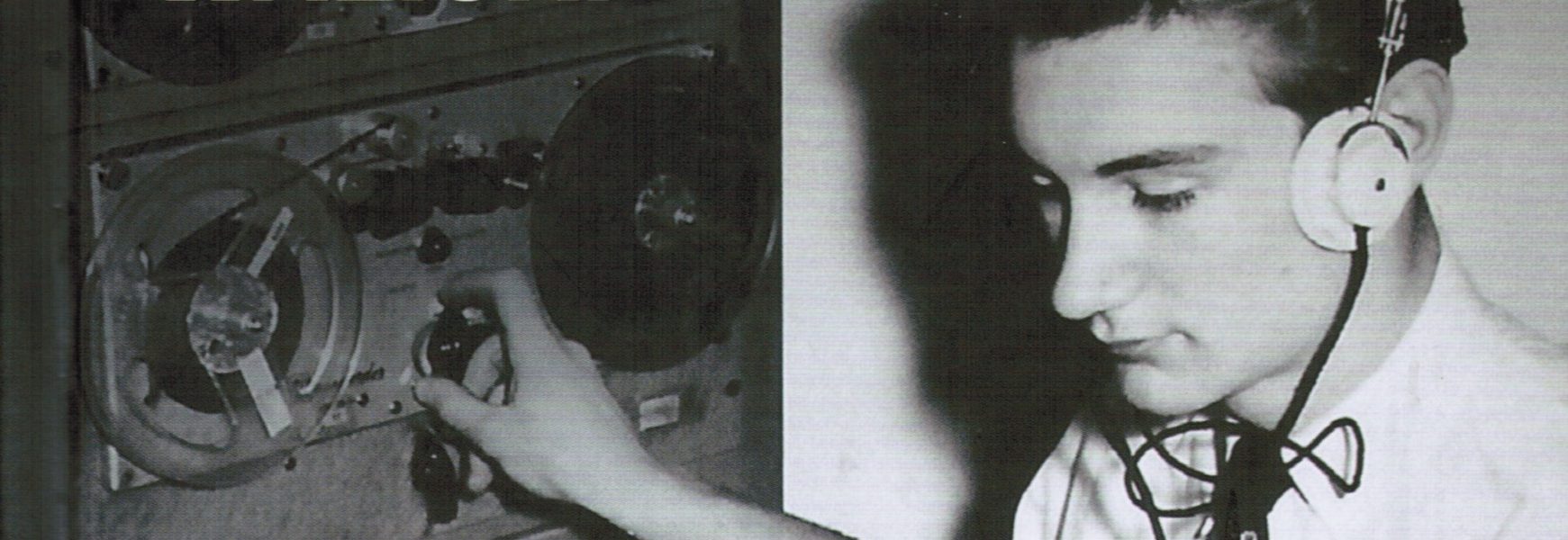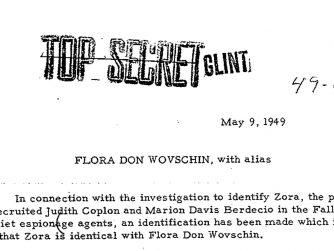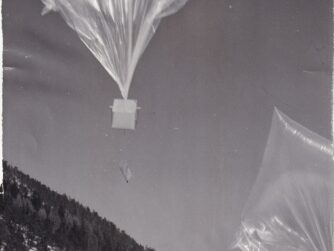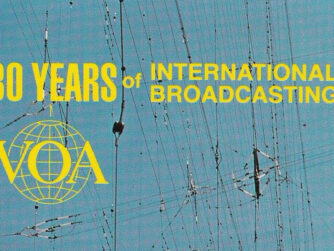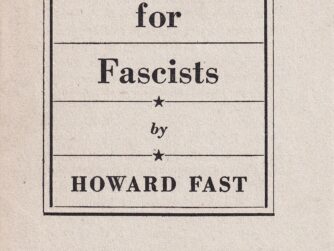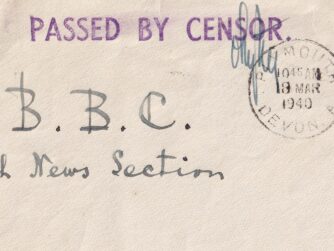![]() By Ted Lipien for Cold War Radio Museum
By Ted Lipien for Cold War Radio Museum
Updated February 17, 2024
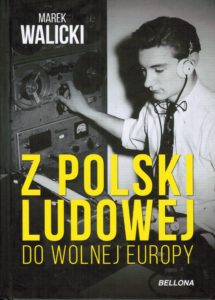
Marek Walicki, the former journalist of the Polish Service of Radio Free Europe and the Polish section of the Voice of America, is the author of Z Polski Ludowej do Wolnej Europy (From People’s Poland to Free Europe), Bellona, Warsaw, 2018, a memoir of his life and radio career. During World War II, Walicki was a member of the Gray Ranks, a codename for the anti-Nazi underground paramilitary unit of the Polish Scouting Association (Związek Harcerstwa Polskiego – ZHP). In 1949, he escaped from Poland through Czechoslovakia to the American occupation zone of Germany. In 1952, he became an employee of the Voice of Free Poland (later the Polish Service of Radio Free Europe), initially as a monitor of radio broadcasts from Poland and later as an author of programs and news reports. In later years he worked for the RFE Bureau in New York and at the Voice of America in Washington, DC, becoming the chief of the VOA Polish Service before his retirement in 1994. He is also a collector of works by Polish artists and a leading expert in the United States on Polish painters. Marek Walicki’s book has been expanded with new chapters and republished in 2023 by Wydawnictwo Ossolineum, part of the prestigious national cultural foundation, library, archives, and research center in Poland.
After the Soviet-imposed communist regime took control of his country and established a totalitarian Stalinist dictatorship, Marek Walicki had to sneak through two heavily guarded Iron Curtain borders to escape in 1949 from Poland to the American occupation zone in Germany. At the time of his escape, he just turned 18. The Iron Curtain was already in place. From then on, almost his whole life was about trying to pierce and destroy the information barriers separating Poland and the rest of East-Central Europe from the West and the Free World. His book is mostly about his struggle with communist totalitarianism and its propaganda. As a patriotic Pole with a great sense of duty instilled in him by his family and a journalist who followed the highest ethical standards, he devoted his life in exile to defending the truth.

To protect his parents, Marek admits that he did not tell them of his plans to escape from Poland. He knew they would have tried to stop him, but their concern for his safety and well-being would not have been wrong. Marek risked being shot by communist border guards or, if caught alive, being sent to prison for many years. He rightly assumed that if that happened, it would have been better if his parents could say they knew nothing, although it would not save them entirely from reprisals. He was probably right in noting that the director of his high school – a woman who had held that position since 1905 and was not sympathetic to communism – was punished for his escape. The communist authorities replaced her with a communist educator.
Marek and his friend, who went to the same high school and fled with him to the West, were lucky. They slipped unnoticed through the Polish-Czechoslovak border and traveled through Czechoslovakia by train with the help of Marek’s Czech friends in Prague. His Czech hosts had declared their loyalty to the Czechoslovak Communist Party to have a safer life but did not betray their Polish friend. Marek and his companion crossed the Czechoslovak-West German border without being spotted.
One thing these Polish youths did not lack was courage. Even more significant was their desire shared by many Poles of all ages to see their beloved country free and democratic after the horror of the German occupation and the repressions by the Soviet-imposed communist regime. They lived through the 1944 Warsaw Uprising against the Germans, which failed because Stalin had halted the Red Army advance and blocked American and British help to the Polish non-communist insurgents. They did not want to live in a country that went from being ruled by one foreign totalitarian dictatorship to being led by a puppet government of another. Marek thought that with American help, he would return to Poland to liberate it from the Soviet-established communist regime. He eventually returned to free Poland, but not at all in the way he had imagined he would. He writes that when he fled from communism in late October 1949, it did not even cross his mind that he would become a journalist.
As for many Poles of his generation, history determined the course of Marek’s life. He was only eight years old when Nazi Germany and Soviet Russia became allies and started World War II in September 1939 by invading and dividing Poland. The Poles were the first nation to put up armed resistance against German aggression. They were the first to fight Nazi Germany. But they needed outside help to defend their country, not just against one but two totalitarian powers. One of them was Stalinist Russia.
Poland’s Western allies, France and Great Britain, did not open a second front in September 1939, as the Polish government had expected. The Poles were left to fight alone against a much better-equipped German Army attacking from the west and against a much more powerful Red Army in the east. Some young Americans or those who watched a recent interview Tucker Carlson conducted with Vladimir Putin may not know that Red Russia also attacked Poland and occupied part of its territory at the start of the Second World War. In repeating Stalin’s lies without being challenged by the conservative American media commentator, the Russian autocrat tried to blame Poland for starting World War II. The truth is that both Hitler and Stalin had started the war and that soon after annexing eastern Poland, Stalin ordered hundreds of thousands of Polish citizens – men, women, and children – deported in packed cattle trains to Soviet slave labor camps and collective farms in Siberia and in other remote parts of the USSR.
During much of the war, Marek lived with his parents in an apartment in Warsaw, where his mother and father, both dentists, also received patients. In 1943, when their Warsaw apartment was destroyed during one of the Soviet bombing air raids, the Walicki family found shelter in an addition of a former royal palace in the Wilanów district of Warsaw. Before the war, the Polish owners of the Wilanów palace, Count Adam Branicki and his wife Beata, were patients and friends of his parents. At the beginning of the war, the Germans arrested the Polish aristocrat and his sister and confiscated his art collection and landholdings. But after the intervention of the Italian royal family, the Gestapo released him and allowed the Branicki family and their many guests to live in the Wilanów palace. There, Marek met young Poles, only slightly older than he was, who were members of the anti-Nazi Polish underground resistance movement Armia Krajowa (Home Army) or AK. This largest clandestine army in German-occupied Europe was loyal to the democratic, multiparty Polish Government-in-Exile in London. At 12, Marek joined the Boy Scouts unit of Armia Krajowa. The underground Polish army accepted teenagers like him to become couriers who carried messages and engaged in civil resistance by painting anti-Nazi slogans on buildings and distributing underground newspapers. Marek writes that some packages he had to deliver were too heavy to have only papers but added that, in obeying orders, he did not try to see what was in them.
As World War II was nearing its end, Marek had no way of knowing that his future and that of his country was being decided not by his compatriots but secretly and without the knowledge of the multiparty Polish Government in Exile, by the leaders of the great powers in Moscow, London, and Washington. Regardless of what the Western leaders may have wanted for Eastern Europe after the war, the Soviet dictator was not going to give up on his plan to keep the territories the Red Army had occupied in 1939 and his desire to place Poland and other neighboring counties under Russia’s control. Critical to misleading the West about Stalin’s intentions was the perceived need to hide his enormous crimes from Western public opinion. One of the most horrific ones was the Katyn massacre. Helping the Soviet regime with propaganda to cover up the Katyn mass murders, the Gulag slave labor camps, and other communist atrocities were many left-leaning Western journalists, a few politicians, and a large number of intellectuals. Fortunately, there were also American journalists, diplomats, and politicians, including members of the U.S. Congress of both parties, who were pointing out, in public, but more often privately, especially while the war with Germany and Japan was not yet won, that President Roosevelt’s trust in Stalin was a colossal mistake.
When, under the secret terms of the Hitler-Stalin Pact, the Red Army invaded eastern Poland, thousands of Polish officers who had surrendered or were captured became prisoners of war in Russia. Having decided to destroy Poland’s military and intellectual elites to limit future resistance to the expansion of Soviet borders and influence, Stalin secretly ordered in March 1940 the murder of about 22,000 Polish leaders in genocidal executions, which later became collectively known as the Katyn massacre. It was an ominous sign of what Poland and the rest of the world could expect from Stalin, but to get the American and British leaders and Western public opinion to accept Russian control of East-Central Europe, the Soviet government blamed the Germans for committing this atrocity. President Roosevelt and Prime Minister Churchill went along with the Soviet Katyn lie to keep Stalin as an ally against Germany and Japan for the duration of the war. But Roosevelt also naively wanted to secure cooperation from “Uncle Joe,” as he endearingly called him, in securing the post-war peace. U.S. government propagandists in the Office of War Information (OWI), which included the Voice of America, then known under various other names, were hard at work trying to sell to Americans and foreign audiences the myth of Stalin as a benevolent leader and Soviet communism as a progressive political, social, and economic system with only minor correctable imperfections.
Most Poles, however, were not fooled by such Russian or American propaganda. Since the spring of 1943, they knew who was behind the Katyn murders even though both the wartime Voice of America, the BBC, and the vast majority of Western journalists eagerly embraced the Soviet hoax. American communist Howard Fast – also a prolific writer and a later recipient of the Stalin Peace Prize – was in charge of writing and editing Voice of America news when the Germans announced the discovery of the Katyn graves in April 1943. The underground Polish authorities in charge of anti-Nazi resistance had their concealed agents among the observers of the German exhumation of the Katyn graves. There was absolutely no doubt from medical and physical evidence that the murders were committed in 1940 when the Soviets were in charge of the Polish military officers and other prisoners of war. To pin the murders on the Germans, the Soviets insisted that the Polish officers died in 1941 when the area around Katyn was under the control of the German Army.
The news of the Soviet responsibility for the massacre quickly spread in Poland through word of mouth. Even some of the Polish communists, especially those who were survivors of Soviet prison camps, privately said that the Soviets carried out the Katyn murders but remained silent in public. Ironically, a former Voice of America Polish Service editor in New York, Stefan Arski (aka Artur Salman), a Socialist Party activist who had returned to Poland after the war and joined the Communist Party, became the chief anti-American propagandist and defender of the Soviet Katyn lie. Meanwhile, his former Voice of America colleague, Mira Michalowska (employed by VOA as Mira Złotowska), married a high-ranking Polish communist diplomat and published soft pro-regime propaganda in the United States. She informed American readers of Harper’s magazine in 1946 that the Polish communists were committed to observing the rule of law.
The manipulation of Western public opinion was a lengthy endeavor helped by many fellow travelers and witting or unwitting agents of influence for Soviet Russia. The model for left-leaning Western journalists who had embraced Soviet propaganda was the New York Times Pulitzer Prize-winning Moscow correspondent Walter Duranty, who deliberately lied about the Soviet-engineered famine that took the lives of millions of Ukrainians in the 1930s. He and other Western journalists based in Russia later attacked Welsh reporter Gareth Jones, who told the truth about this unimaginable crime against humanity. Yet, still too ashamed to face up to this historic failure of Western journalism, the Pulitzer Prize Board refused in 2003 to take away Duranty’s Pulitzer Prize. Walicki’s book is, therefore, a valuable resource since the influence of Soviet propaganda has never been eliminated in the United States. It is now experiencing reemergence under Russian President Vladimir Putin, helped this time not by the radically left-leaning but by some of the radically right-leaning American politicians and journalists.
After the end of World War II, Marek Walicki, along with millions of other East-Central Europeans, was doomed to pay the price for the world conflict started by Hitler and Stalin. After Hitler betrayed his alliance with the Kremlin and secretly attacked Russia in June 1941, the Soviet Union emerged as America’s most valuable military ally. Roosevelt and Churchill secretly promised Stalin at the wartime Big Three conferences in Tehran and Yalta that he could keep the eastern part of Poland he had already acquired in his earlier deal with Hitler. Not only the Poles but also the Ukrainians and the Belorussians, who represented the majority of the population of pre-war eastern Poland and wanted to have their own nation-states after enduring Soviet communist terror, were not consulted.
When he fled to the American zone in Germany in 1949, Marek was too young and too inexperienced to realize that the West was not going to risk another war, this time with Soviet Russia, to liberate Poland with military force. He wrote in his memoirs that he was escaping with the hope of returning as a soldier of the Polish Army under the command of General Władysław Anders, who avoided being killed in Katyn. Stalin signed an agreement with the Polish Government-in-Exile in London in 1941 and released General Anders and other Polish prisoners in the Gulag in 1941. He still feared then that Hitler might succeed in conquering Russia. Evacuated by Anders from the Soviet Union to the West through Persia, Polish soldiers later fought against the Germans alongside American, British, and other allied troops, helping to liberate Italy. At the war’s end, many of them no longer had homes to return to as their towns and villages were on the territory annexed by the Soviet Union. A few returned to Poland. Many were arrested, tortured, and executed by the communist security services.
Life in Poland, freed from the Germans by the Red Army, also did not mean the end of terror for Marek’s family. Marek wrote that on the first day of the “liberation” of the area near Warsaw, Soviet soldiers raped dozens of local women, several of whom died. In January 1949, the Polish communist secret police arrested Marek’s older half-brother, Michał Walicki, a noted art historian, and falsely accused him of collaborating with the Germans.
Soviet and Polish communists falsely used the fascist label against those non-communist Poles who had risked their lives fighting the Nazis during the German occupation or served as officers and soldiers in the Polish Army fighting Nazi forces in the West. Many innocent men and women were tortured and executed. Others spent years in prisons in Poland or were sent to the Gulag forced labor camps in Russia. Marek writes about a young woman arrested and sent to Siberia. Her fiancé, also a member of the anti-Nazi resistance, escaped to the West. She survived and returned to Poland. Her fiancé, thinking she was dead, married another woman. The Soviet NKVD secret police arrested and sent to Russia Count Branicki and his wife, the aristocratic couple who gave Marek’s family a place to live during the war, as well as their two daughters. They were allowed to return to Poland, but the Polish communist secret police detained and interrogated Count Branicki for a few more weeks in 1947. The communist regime confiscated his remaining property, including the Wilanów Palace, and artworks he managed to save from the Germans and Soviet soldiers.
At the time of his escape to the West, Marek did not know that the Western Allies had already demobilized the Anders Army, which he had hoped to join. There were diplomatic protests by American and British governments after the war but no plans for forcing Russia to honor the promise of free and democratic elections in Poland and the rest of East-Central Europe. In 1949, the Soviet Union successfully tested its first atomic bomb thanks to the help of American Communists and British agents supplying the Soviets with stolen Western military secrets. The Soviet nuclear blackmail was in full swing.
Marek writes in his book that when cold and hungry, he crossed the Czechoslovak-German border in late October 1949 in rain and snow; he had no idea he would later work as a journalist and help to liberate his native land, not with weapons but with words. Marek became an employee of the Voice of Free Poland (later the Polish Service of Radio Free Europe) in 1952, initially as a monitor of radio broadcasts from Poland and later as an author of programs and news reports. After escaping to the West, one of his proposals for Radio Free Europe (RFE) was broadcasting historical programs for young people. He also proposed to the Polish Service director, Jan Nowak-Jeziorański, to create programs about the scouting movement “that would make young people aware of how the communists remade the Polish Scouting Association on the model of the Soviet Pioneer” after rejecting Baden-Powell’s principles.
In 1955, Marek emigrated to the United States and worked from 1960 to 1976 as an editor in the New York branch of RFE’s Polish Service. After the New York office was closed, he went to work in the Polish section of the Voice of America. From 1982 to 1993, he was my deputy when I served as the section chief. During that time, we multiplied the number of VOA listeners in Poland. Marek was later the head of the section until his retirement in 1994.
In his memoirs From People’s Poland to Free Europe, Walicki included a photograph of the dedication in the book Stones for the Rampart from the author, Aleksander Kamiński, then vice-chairman of the Polish Scouting Association, whom he met in Łódź in 1946.
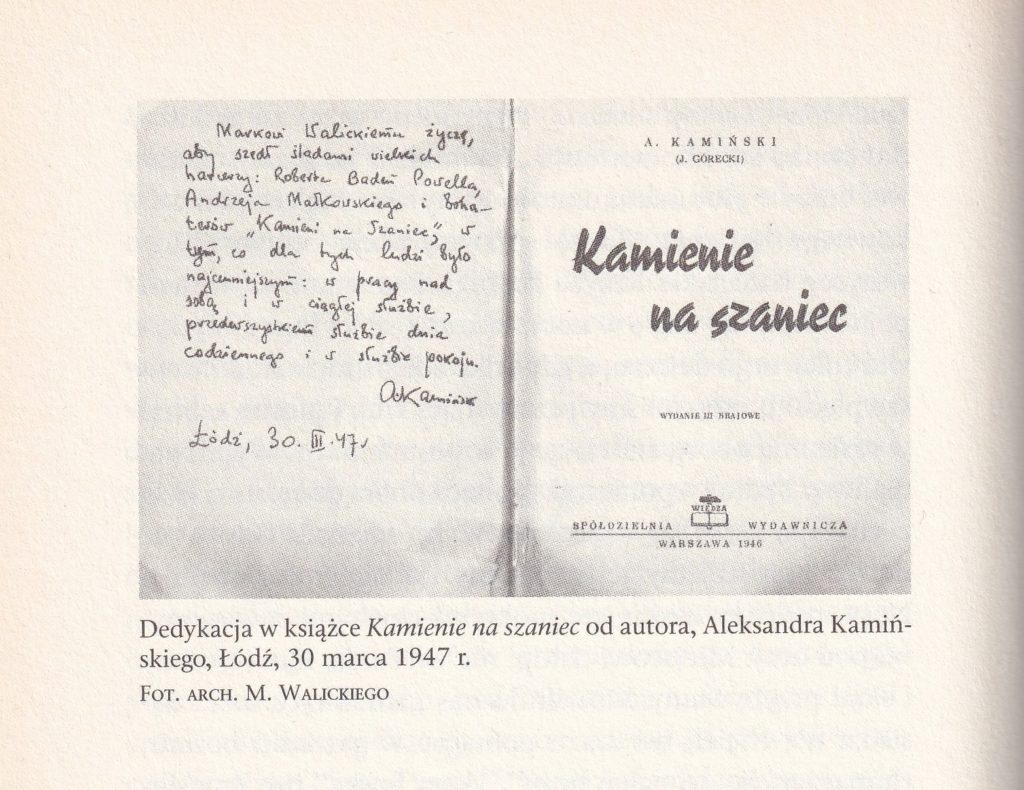
I wish Marek Walicki that he would follow in the footsteps of great scouts: Robert Baden-Powell, Andrzej Małkowski, and the heroes of “Stones for the Rampart,” in what was the most valuable for these people: in working on improving oneself and in continuous service, above all, in the service of everyday life and the service of peace. A. Kamiński, Łódź, March 30, 1947.
Walicki recalls that shortly after he met with Kamiński, the “Communist Party group”… in the scouting leadership in the People’s Republic of Poland “reassessed Kamiński’s book, strongly rejecting all his recommendations.” Walicki and several scouts from his team decided to leave the Polish Scouting Association, convinced that the Baden-Powell model had ceased to apply in the Polish scouting movement as it became controlled by the communists – however, many who remained still tried to uphold the old personal virtues and patriotic values as much as possible.
Before the communist authorities in Poland took over the scouting leadership, Walicki mentions going to a summer scout camp in Tomaszkowo near Olsztyn in 1946, where the camp’s leader was sub-scoutmaster Zbigniew Brydak. Brydak later tried to force the scouts to wear red scarves, following the example of the Soviet pioneers. He then mysteriously appeared in West Germany. Brydak was a communist security service agent who found employment in the Polish branch of the Voice of America in Munich and was an occasional contributor to RFE Polish Service programs. While spying on VOA and RFE journalists, Brydak also made attempts to lure Walicki out of the West so that the authorities of the People’s Poland could capture him. Marek saw through Brydak’s ploy and shared his suspicions about his former scoutmaster with Jan Nowak.
Walicki wrote that even before his spy mission to the West, Brydak recruited several of his colleagues in Poland for a fictitious secret anti-communist scouting, and when there were no more candidates – he handed over all to the torturers of the communist security service.” Exposed as a spy, Brydak returned from West Germany to the People’s Republic of Poland after being released by the Americans. He engaged in pro-regime and anti-Western propaganda in Poland, writing articles for the “Świat” magazine, edited by Stefan Arski, who also previously worked for the Voice of America. Under his real name Artur Salman, Arski was an employee of the Office of War Information (OWI) in New York during the war. Arski was in contact with Oskar Lange, a Soviet agent of influence and the future first ambassador in Washington of the People’s Republic of Poland, and with Bolesław Gebert, a Soviet intelligence agent and the future ambassador in Turkey for the Warsaw regime.
Fearing dismissal as part of President Truman’s efforts to remove pro-Soviet influence at the station, Arski resigned from the Voice of America in 1947. After a short association with the Embassy of the Polish People’s Republic in Washington as the writer of a policy booklet on the issue of the Polish-German border, Arski returned to Poland, joined the Polish United Workers Party, and was one of the country’s pro-regime and anti-Western propagandists. He wrote articles and books denouncing journalists of Radio Free Europe and Voice of America. He also strongly criticized the efforts of the U.S. Congress to reveal the truth about the Katyn massacre of thousands of Polish POW military officers and intellectual leaders in Soviet captivity.
Like Arski, another former Voice of America editor, Mira Złotowska Michałowska, also returned to Poland after the war. She married a high-ranking communist diplomat and translated books by the former VOA chief news writer and editor Howard Fast. She also translated Hemingway and was a talented writer herself. Her own stories were made into a popular Polish television series. Walicki does not mention Michałowska and Fast in his book. He and many other Poles, those who stayed in Poland and those who became refugees in the West, followed a different path than the former Voice of America journalists who later became propagandists for the communist regime in Poland. Walicki mentions Arski briefly, but his book focuses on the contributions of Radio Free Europe to the fall of communism in Poland and his work for the Voice of America during the last decades of the Cold War.
One of Walicki’s colleagues at the Voice of America, about whom he writes in his book, was the legendary anti-Nazi underground radio coder Zofia Korbońska. Together with her husband, Stefan Korboński, the head of the anti-Nazi Social Resistance Department of the Directorate of Underground Resistance, she had to flee Poland in 1947 to avoid arrest by the communist regime or the Soviet NKVD. After the war, Zofia Korbońska and other refugees from communism replaced the pro-Soviet Voice of America Polish staff. However, they continued to encounter a fundamental lack of understanding from much of the American management for the needs of journalism and radio broadcasting to a country ruled by a repressive and totalitarian regime.
During the war, the Korbońskis were responsible for the Home Army radio station, which transmitted current information to London, which was then retransmitted to Poland by the “Świt” radio station. Zofia Korbońska started working for the Voice of America in 1948 on the recommendation of the former American ambassador to Poland, Arthur Bliss Lane. After a short period of relative editorial freedom in the final years of the administration of President Truman and the first years of the administration of President Eisenhower in revealing the atrocities of the regimes of Russia and the Polish People’People’sic, the management of the Voice of America resumed partial censorship of programs considered too critical of the Soviet Union and communists in Central and Eastern Europe.
Marek Walicki writes with appreciation about journalistic freedom at Radio Free Europe compared to the working conditions at the Voice of America. In the book, he describes an attempt by the management to censor a VOA news report in 1978 about the Katyn massacre. The censorship was met with strong protests from the employees of the Polish section and criticism in the U.S. Congress and the American media. Even during the independent Solidarity trade union’s struggle for democracy in Poland, the Voice of America’s central news department sometimes issued texts for translation by foreign-language sections with terms such as “illegal Solidarity.” Because one of the employees of the Polish unit translated “illegal” literally from English, Walicki crossed out the adjective or changed it to “delegalized.” Much of the pro-Soviet censorship at the Voice of America ended, however, with the start of the Reagan administration. Such censorship by the VOA management, which also included banning interviews with the Nobel Prize-winning dissident Russian writer Alexandr Solzhenitsyn, was never practiced at Radio Free Europe and Radio Liberty.
Despite various difficulties, Marek Walicki called his work at both Radio Free Europe and the Voice of America his life’s success story:
And so the radio stations – Free Europe and Voice of America – replaced the Polish army I dreamed of joining when escaping from the People’s Republic of Poland in 1949. I served in them for nearly half a century. I retired with a sense of a well-fulfilled duty, having lived to see a free and independent Poland. And although – in my opinion – both Polish sections of these radio stations were closed much too early, I am very happy today that after various major and minor struggles or battles, we achieved – through a joint effort – a great victory.
Z harcerstwa Szarych Szeregów do dziennikarstwa w Radiu Wolna Europa i Głosie Ameryki
Tadeusz Lipien dla Muzeum Radia Zimnej Wojny

Marek Walicki, były dziennikarz Rozgłośni Polskiej Radia Wolna Europa i sekcji polskiej Głosu Ameryki (ang. Voice of America), jest autorem książki Z Polski Ludowej do Wolnej Europy (Bellona, Warszawa, 2018). Podczas II wojny światowej Walicki był członkiem Szarych Szeregów. W 1949 uciekł z Polski przez Czechosłowację do amerykańskiej strefy okupacyjnej Niemiec. W 1952 został pracownikiem Głosu Wolnej Polski (późniejsza nazwa Rozgłośnia Polska Radia Wolna Europa), początkowo w nasłuchu radiowym, a następnie jako autor programów i reportaży.
Jedną z propozycji Marka Walickiego po ucieczce na Zachód i podjęciu pracy w monachijskiej siedzibie RWE było nadawanie audycji historycznych dla młodzieży. Zaproponował również dyrektorowi Rozgłośni Polskiej Janowi Nowakowi-Jeziorańskiemu stworzenie audycji harcerskich, „które uświadamiałyby młodzież, w jaki sposób komuniści, po odrzuceniu ideologii Baden-Powella, przerabiali ZHP na wzór sowieckiego Pioniera”.
Po wyjeździe do Stanów Zjednoczonych w 1955 pracował od 1960 do 1976 jako redaktor w nowojorskim oddziale Rozgłośni Polskiej RWE. Po jego całkowitej likwidacji przeszedł do pracy w sekcji polskiej Głosu Ameryki. Od 1982 do 1993 był zastępcą szefa sekcji Tadeusza Lipienia w okresie kiedy rozgłośnia wielokrotnie zwiększyła liczbę słuchaczy w Polsce, i był kierownikiem sekcji od 1993 do przejścia na emeryturę w 1994.
Walicki był w młodości ściśle związany z harcerstwem. W 1943 roku, mając dwanaście lat, złożył przysięgę jako zawiszak w drużynie harcerskiej Szarych Szeregów w Wilanowie. Jednym z jego zadań było przenoszenie podziemnej bibuły, a prawdopodobnie także broni.
Po wojnie pozostał kilka lat w harcerstwie. W swych wspomnieniach Z Polski Ludowej do Wolnej Europy, Walicki zamieścił fotografię dedykacji w książce Kamienie na szaniec od autora, Aleksandra Kamińskiego, ówczesnego wiceprzewodniczącego ZHP, którego poznał w Łodzi w 1946 roku.

Markowi Walickiemu życzę, aby szedł śladami wielkich harcerzy: Roberta Baden-Powella, Andrzeja Małkowskiego i bohaterów „Kamieni na szaniec,” w tym, co dla tych ludzi było najcenniejszym: w pracy nad sobą i w ciągłej służbie, przede wszystkim służbie dnia codziennego i w służbie pokoju. A. Kamiński, Łódź, 30 III 47 r.
Walicki przypomina, że wkrótce po jego spotkaniu z Kamińskim, „grupa pezetperowska”… w kierownictwie harcerstwa w PRL „dokonała m.in. ponownej oceny książki Kamińskiego, zdecydowanie odrzucając wszelkie jego zalecenia.” Walicki wraz z kilkoma harcerzami swojej drużyny postanowili wystąpić z peerelowskiego ZHP przekonani, że ideologia baden-powellowska przestała obowiązywać, chociaż wielu, którzy pozostali, starało się nadal w miarę możliwości kierować się nią w ruchu harcerskim.
Zanim władze komunistyczne zdominowały ZHP, Walicki wspomina o wyjeździe w 1946 roku na letni obóz harcerski w Tomaszkowie koło Olsztyna, gdzie komendantem obozu był podharcmistrz Zbigniew Brydak. On to później, jako agent UB w monachijskim oddziale polskim Głosu Ameryki i okazyjny współpracownik RWE, usiłował podstępnie ściągnąć Walickiego z Zachodu, by mógł być schwytany przez funkcjonariuszy Urzędu Bezpieczeństwa PRL. Walicki nie dał się namowić do powrotu do Polski i podzielił się z Janem Nowakiem swymi podejrzeniami o Brydaku.
Walicki pisze, że jeszcze przed swą misją szpiegowską na Zachód, Brydak zwerbował w Polsce „kilku swych kolegów do fikcyjnego tajnego antykomunistycznego harcerstwa, a gdy zabrakło już dalszych kandydatów – wydał wszystkich sprowokowanych w ręce oprawców UB”. Wcześniej Brydak zmuszał harcerzy do noszenia czerwonych chust na wzór sowieckich pionierów.
Zdemaskowany jako szpieg, Brydak po wypuszczeniu go na wolność przez Amerykanów wrócił z Niemiec Zachodnich do PRL. Po powrocie do Polski zajmował się proreżimową i antyzachodnią propagandą pisząc m.in. artykuły do czasopisma „Świat” redagowanego przez Stefana Arskiego, który także pracował wcześniej w Głosie Ameryki. Pod swym prawdziwym nazwiskiem Artur Salman, Arski był w czasie wojny pracownikiem Biura Informacji Wojennej w Nowym Jorku, gdzie powstawały audycje amerykańskiej rozgłośni rządowej. Był w kontakcie z sowieckim agentem wpływu Oskarem Lange, przyszłym ambasadorem PRL w Stanach Zjednoczonych, i z agentem wywiadu sowieckiego Bolesławem Gebertem, przyszłym ambasadorem PRL w Turcji.
Obawiając się pozbawienia etatu w ramach prób administracji prezydenta Trumana osłabienia pro-sowieckich wpływów w rozgłośni, Arski zrezygnował w 1947 roku z pracy w Głosie Ameryki. Po krótkiej współpracy z Ambasadą PRL, wrócił do Polski, wstąpił do PZPR i był w kraju jednym z głównych proreżimowych i antyzachodnich propagandystów. Pisał artykuły i książki potępiające dziennikarzy Radia Wolna Europa i Głosu Ameryki. Ostro krytykował również zabiegi Kongresu Stanów Zjednoczonych o ujawnienie prawdy o sowieckiej zbrodni katyńskiej.
Do Polski wróciła także po wojnie była pracowniczka sekcji polskiej Głosu Ameryki Mira Złotowska, która wzięła ślub z komunistycznym dyplomatą i tłumaczyła książki byłego głównego redaktora wiadomości Voice of America Howarda Fasta, amerykańskiego komunisty, który w 1953 roku otrzymał Międzynarodową Stalinowską Nagrodę Pokoju. Walicki nie wgłębia się w historię Głosu Ameryki w czasie wojny, ale pisze sporo o swoim szefie w Radiu Wolna Europa Janie Nowaku i o Zofii Korbońskiej w Głosie Ameryki. Odnotowuje też krótko w książce rolę Stefana Arskiego.
Marek Walicki i wielu innych Polaków, tak w Polsce jak i na emigracji, poszli inną drogą niż byli pracownicy Głosu Ameryki: Arski, Brydak, i utalentowana pisarka Złotowska (nazwisko po drugim mężu – Mira Michałowska; pisząca pod pseudonimami – Maria Zientarowa i Mira Michal; autorka opowiadań do serialu telewizyjnego Wojna domowa). Starsi koledzy Walickiego, tacy jak Zofia Korbońska, która wraz z mężem Stefanem Korbońskim, szefem Oporu Społecznego w Kierownictwie Walki Podziemnej, musiała uciekać z Polski w 1947 roku, by uniknąć aresztowania przez UB lub NKWD, zastąpili prosowiecką ekipę Głosu Ameryki, chociaż oni i on później nadal natrafiali w pracy dziennikarskiej na brak zrozumienia ze strony amerykańskiego kierownictwa Głosu.
W czasie wojny, Korbońscy byli odpowiedzialni za radiostację AK, która przekazywała do Londynu bieżące informacje, retransmitowane następnie do Polski przez rozgłośnię „Świt”. Zofia Korbońska rozpoczęła pracę w Głosie Ameryki w 1948 roku z rekomendacji byłego ambasadora amerykańskiego w Polsce Arthura Bliss Lane. Po krótkim okresie względnej swobody w końcowych latach administracji prezydenta Trumana i pierwszych latach administracji prezydenta Eisenhowera w ujawnianiu okrucieństw reżimów Rosji i PRL, kierownictwo Głosu Ameryki wznowiło częściową cenzurę programów uważanych za zbyt krytyczne w stosunku do Związku Sowieckiego i komunistów w Europie środkowo-wschodniej.
Marek Walicki wyraża się z uznaniem o swobodzie dziennikarskiej w Radiu Wolna Europa w porównaniu z warunkami pracy w Głosie Ameryki. Opisuje w książce próbę ocenzurowania w 1978 roku przez kierownictwo rozgłośni wiadomości Głosu Ameryki o kulisach zbrodni katyńskiej, co spotkało się z ostrym protestem pracowników sekcji polskiej oraz krytyką w Kongresie Stanów Zjednoczonych i w mediach amerykańskich. Nawet w okresie Solidarności amerykański dział wiadomości Voice of America wydawał niekiedy dzienniki do tłumaczenia przez sekcje obcojęzyczne z takimi określeniami jak illegal Solidarity („nielegalna Solidarność”). Ponieważ jeden z pracowników sekcji polskiej tłumaczył illegal dosłownie z angielskiego, Walicki wykreślał przymiotnik lub zamieniał na „zdelegalizowana”. Dopiero administracja prezydenta Reagana zdołała wyeliminować większość ograniczeń w krytyce reżimów komunistycznych w programach Głosu Ameryki. Podobnej prosowieckiej cenzury nigdy nie było w Radiu Wolna Europa i w Radiu Swoboda.
Pomimo różych utrudnień, Marek Walicki nazwał swą pracę w obu rozgłośniach życiowym sukcesem:


